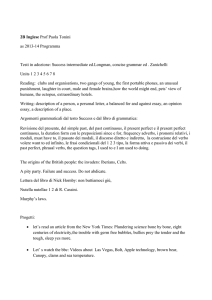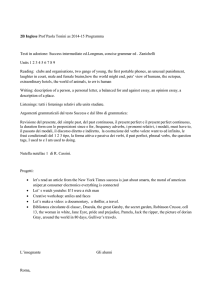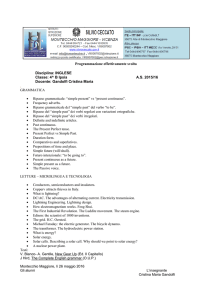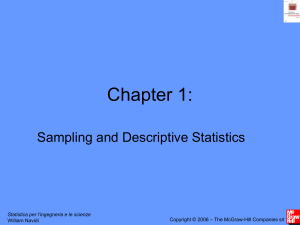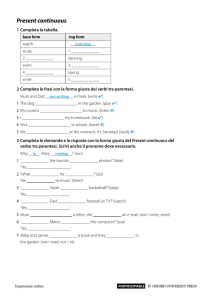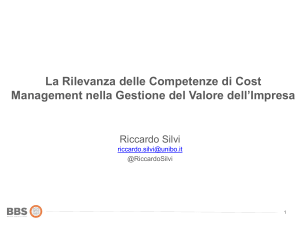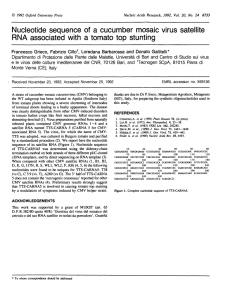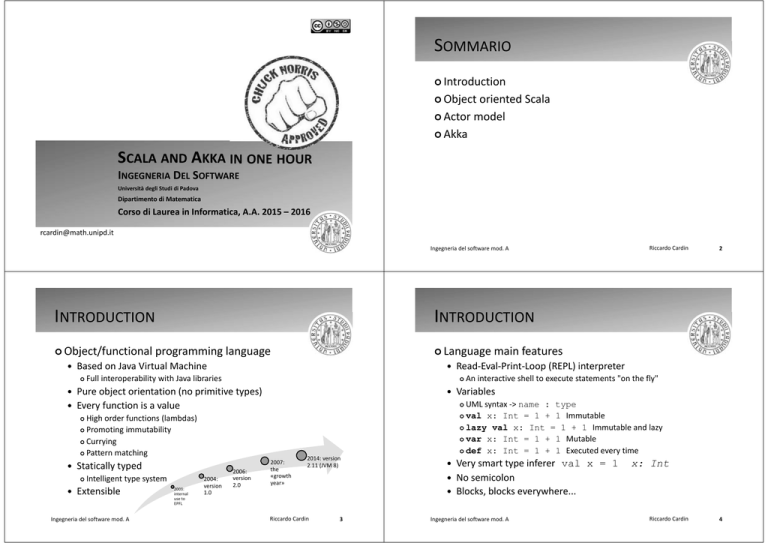
SOMMARIO Introduction Object oriented Scala Actor model Akka SCALA AND AKKA IN ONE HOUR INGEGNERIA DEL SOFTWARE Università degli Studi di Padova Dipartimento di Matematica Corso di Laurea in Informatica, A.A. 2015 – 2016 [email protected] Ingegneria del software mod. A INTRODUCTION INTRODUCTION Object/functional programming language Language main features
Based on Java Virtual Machine
Full interoperability with Java libraries
UML syntax ‐> name : type
val x: Int = 1 + 1 Immutable lazy val x: Int = 1 + 1 Immutable and lazy
var x: Int = 1 + 1 Mutable def x: Int = 1 + 1 Executed every time High order functions (lambdas) Promoting immutability Currying Pattern matching Statically typed
Intelligent type system Extensible Ingegneria del software mod. A 2003: internal use to EPFL Variables
An interactive shell to execute statements "on the fly"
2 Read‐Eval‐Print‐Loop (REPL) interpreter
Pure object orientation (no primitive types) Every function is a value Riccardo Cardin 2004: version 1.0 2006: version 2.0 2007: the «growth year» 2014: version 2.11 (JVM 8)
Riccardo Cardin 3 Very smart type inferer val x = 1
No semicolon Blocks, blocks everywhere... Ingegneria del software mod. A x: Int
Riccardo Cardin 4 INTRODUCTION OBJECT ORIENTED SCALA Language main features Everything is an object
Every statement is a "pure" expression
No return statement needed! Values The if-else statement is a value y = 4
val
// x has type String
val x = if (y < 3) "minor" else "greater"
Imperative for statement is not supported Use the for-yield statement instead // Returns an array of integers between 2 and
for (i <- (1 to 100)) yield i + 1
101
Every char can be used to define names (%$#@?...) Full integration with every Java library References (Scala and Java) Riccardo Cardin Ingegneria del software mod. A 5 Ingegneria del software mod. A OBJECT ORIENTED SCALA OBJECT ORIENTED SCALA Classes Classes
Ingegneria del software mod. A Riccardo Cardin 7 Use equal "=" iff the method is a function No public class
}
val immutable value, getter only var mutable value, getter and setter def defines methods (and functions too...)
// Every secondary Ctor must call the main Ctor as
// first statement (very restrictive)
def this(name: String) = this(name, "", null)
def age(): Int = { /* return the age */ }
// Override intention must be declared
override def toString = s"My name is $name $surname"
Ctor body is made of statements in class body Accessor methods are build automatically
class Person(val name: String, val surname: String,
val birth: Date) {
// Main Ctor body here
6 Main constructor is declared within Class name
Riccardo Cardin You can have more than a class into a .scala file No static methods (wait a minute...) Ingegneria del software mod. A Riccardo Cardin 8 OBJECT ORIENTED SCALA OBJECT ORIENTED SCALA Object
Native Singleton pattern implementation object
ChuckNorris extends Person("Chuck Norris") {
// This is a static method
def roundhouseKick = "Roundhouse"
}
println ChuckNorris.roundhouseKick
There can be only one instance of ChuckNorris
Companion object An object called as an existing class Companion object’s methods are static method of the class class
Person(val name: String, val surname: String)
...so let’s introduce objects notation! Ingegneria del software mod. A object Person {
// Companion object
def someStupidStaticMethod = "This is a static method"
}
println Person.someStupidStaticMethod
Riccardo Cardin 9 Ingegneria del software mod. A OBJECT ORIENTED SCALA OBJECT ORIENTED SCALA Object Object
Companion objects implement also Factory Method pattern natively
Every apply method creates an instance of the class Syntactic sugar: Class.apply(...) Class(...)
It’s like a class application (...function anyone?)
Ingegneria del software mod. A Riccardo Cardin
10 Used also to define the entry point of an application There can be more than one apply!!!! class Person(val name: String,
val surname: String)
object Person {
// Factory method
def apply(n: String, s: String) =
new Person(n, s)
}
// Application of the class will return a new instance
val ricky = Person("Riccardo", "Cardin")
// No new operator
Riccardo Cardin The Java way object
Hello {
// Every object containing a main method could be
// Executed. There are no restriction on file name
def main(args: Array[String]) {
println("Hello World!")
}
}
The Scala way object Hello extends App {
// All the code in the object’s ctor body will be
// executed as our application.
// Arguments are accessible via an ‘args’ variable,
// available in the App trait
println("Hello World!")
}
11 Ingegneria del software mod. A Riccardo Cardin 12 OBJECT ORIENTED SCALA OBJECT ORIENTED SCALA Abstract classes Traits: interfaces or abstract classes?
Also defines a main constructor
Like interfaces, they have not a constructor It has to be called from the derived classes’ main Ctor
abstract class Animal(val species: String) {
def walk
// Abstract method
}
class Person(val name: String,
val surname: String)
// Calling main ctor directly in class
// definition
extends Animal("Human") {
def walk = { /* Do some stuff */ }
}
val ricky = new Person("Riccardo", "Cardin")
But, they can have methods with implementation and attributes
Riccardo Cardin 13 Similar (but more powerful) to default methods in Java 8 Multiple inheritance problem trait
A { override def
trait B { override def
trait C { override def
class D extends A with
new
//
D().toString
Ingegneria del software mod. A To implement a single trait, use extends
Otherwise, use with (mixin) toString = "I’m A" }
toString = "I’m B" }
toString = "I’m C" }
B, C
Prints ‘I’m C’
Class linearization: use the rightmost type (more or less...) Ingegneria del software mod. A OBJECT ORIENTED SCALA OBJECT ORIENTED SCALA Traits Traits
Like an interface
// No implementation at all
trait Sorter {
def sort(list: List[Int]): List[Int]
}
class QuickSorter
extends Sorter {
def sort(list: List[Int]) = { /* Do something */ }
}
14 Inside a mixin the super refers to the previuos trait in the linearized‐type
Used to implement the Decorator pattern natively trait Employee {
// ...
def whois(): String
}
class Engineer(name: String, office: String) extends Employee
Like an abstract class trait AbstractDao {
// No Ctor (wtf!)
var pool: Array[Datasource]
def getPool = pool // Implemented method
def save
// abstract method
def delete
// abstract method
}
class UserDao extends AbstractDao {
// Has to implement save and delete
}
Ingegneria del software mod. A Riccardo Cardin trait ProjectManager extends Employee {
abstract override def whois() {
// super refers to the previuos trait on the left
super.whois(buffer)
Statically binded println("and I’am a project manager too!")
Decorator pattern Decorator pattern
}
}
new Engineer("Riccardo","Development") with ProjectManager
Riccardo Cardin 15 Ingegneria del software mod. A Riccardo Cardin 16 OBJECT ORIENTED SCALA OBJECT ORIENTED SCALA Traits and Objects Case classes and pattern matching
Using the companion object of a trait, we can implement the Abstract Factory pattern
// Abstract factory
trait AbstractFactory
// Private classes’ scope is limited to the
// definition file
private class ConcreteFactory1 extends AbstractFactory { /* ... */ }
private class ConcreteFactory2 extends AbstractFactory { /* ... */ }
Turns all ctor params into val (immutable) constants Generates a companion object w/ apply methods Generates toString, equals and hashCode methods properly
object AbstractFactory{
def apply(kind: String) =
kind match {
case “factory1" => new ConcreteFactory1 ()
case “factory2" => new ConcreteFactory1 () factory 2
}
}
val factory = AbstractFactory("factory1")
Ingegneria del software mod. A Riccardo Cardin Checks the equality among attributes 17 OBJECT ORIENTED SCALA
Riccardo Cardin 18 Reactive The match is done recursively on the structure of the type
trait Term
case class Var(name: String) extends Term
case class Fun(arg: String, body: Term) extends Term
def printTerm(term: Term) { term match {
// The clauses uses placeholders for variables.
// If we don’t need the value, we can use Var(_)
case Var(n) =>
print(“We have a variable!”)
case Fun(x, b) =>
print(“We have a function!”)
}
}
Ingegneria del software mod. A Ingegneria del software mod. A Each actor is a form of reactive object, executing some
computation in response to a message and sending out a reply
computation is done
when the
-- John C. Mitchell
Native implementation of Value Object pattern Obviously, case classes can be used in pattern matching...
trait Term
case class Var(name: String) extends Term
case class Fun(arg: String, body: Term) extends Term
Var("x") == Var("x")
// Prints true
ACTOR MODEL Case classes and pattern matching
Scala has a built in pattern matching mechanism Case clauses are matchTest(x: Int): String = x match {
defcase
1 => "one"
evaulated from } case _ => "many"
top to bottom println(matchTest(3))
// Prints ‘many’
Case class: regular class that can be pattern‐matched Riccardo Cardin Execution are in response of external events
Two possible states: sleep / awake There is no the explicit concept of thread An actor can perform basically three actions
19 Sending async messages to another actor or to itself Create new actors Modify its interface (no mutable state) Ingegneria del software mod. A Riccardo Cardin 20 ACTOR MODEL ACTOR MODEL Messages (tasks) Example
They represent the interface of the actor
A state change may corresponds to a new actor
No race conditions: state of an actor in invisibile from outside Interface changes Get_min
Each actor has an associated mail box (queue) No guarantee on the order of reception of messages Min|1
Insert|2
Mail system
Variable through time Messages are read one by one
A1:[1, 2, 4, 7]
A1:[1, 4, 7]
Each actor has an associated mail address Messages are divided in three parts Mail address of
receiver
Operation
tag
target
Payload
A1:[2, 4, 7]
data
Ingegneria del software mod. A Riccardo Cardin 21 Ingegneria del software mod. A Riccardo Cardin ACTOR MODEL AKKA Akka type Receive = PartialFunction[Any, Unit]
trait Actor {
def receive: Receive // Actor actual behavior
implicit val self: ActorRef // Reference to itself
def sender: ActorRef // Reference to the sender of last message
implicit val context: ActorContext // Execution context
}
abstract class ActorRef {
// Send primitives
def !(msg: Any)(implicit sender: ActorRef = Actor.noSender): Unit
def tell(msg: Any, sender: ActorRef) = this.!(msg)(sender)
// ...
}
trait ActorContext {
// Change behavior of an Actor
def become(behavior: Receive, discardOld: Boolean = true): Unit
def unbecome(): Unit
// Create a new Actor
def actorOf(p: Props, name: String): ActorRef
def stop(a: ActorRef): Unit // Stop an Actor
// ...
}
Toolkit and runtime for actor model on JVM Ingegneria del software mod. A Riccardo Cardin 23 Ingegneria del software mod. A Riccardo Cardin 22 24 AKKA Example
Resiliency Distributed counter implementation using actors class Counter extends Actor {
// State == explicit behavior
def counter(n: Int): Receive = {
// Receive two types of messages: ‘incr’ and ‘get’
// ‘incr’ change actor’s behavior
case ”incr” => context.become(counter(n + 1))
// ‘get’ returns current counter value to sender
case ”get” => sender ! n
}
def receive = counter(0) // Default behavior
}
a!incr
a!incr
a!get
a:[0]
a:[1]
sub1.1
Automatic containment and response to errors Actor in a error state are killed or restarted Decision is made by an actor of type supervisor Actors that use supervision are organized in a tree structure The supervisor create its subordinates Internal state
can be
modelled using
closures
class Manager extends Actor {
// OneForOneStrategy restarts only actor which died
override val supervisorStrategy = OneForOneStrategy() {
case _: DBException => Restart // reconnect to DB
case _: ActorKilledException => Stop
case _: ServiceDownException => Escalate
}
// ...
context.actorOf(Props[DBActor], ”db”)
// ...
}
a:[2]
Riccardo Cardin 25 Ingegneria del software mod. A Riccardo Cardin 26 REFERECES Supervisor
Actor lyfecycle An actor
Functional Programming Principles in Scala (Coursera) https://www.coursera.org/course/progfun Principles of Reactive Programming (Coursera) https://www.coursera.org/course/reactive Scala School! http://twitter.github.io/scala_school/ Scala for the Impatient, Cay Horstmann, Addison‐Wesley 2012 http://www.horstmann.com/scala/index.html Getting Started Tutorial (Scala): First Chapter http://doc.akka.io/docs/akka/2.0/intro/getting‐started‐
first‐scala.html Akka: Scala Documentation http://doc.akka.io/docs/akka/2.3.14/scala.html?_ga=1.6
2489391.244507724.1445894179
Start
new Actor
preStart
fail
There can be
multiple restarts
Restart
preStart
new Actor
Ingegneria del software mod. A sub2
AKKA ActorRef remains
valid between two
different restarts
sub1
sender!2
Ingegneria del software mod. A Error flow
AKKA sup
stop
Stop
Riccardo Cardin 27 Ingegneria del software mod. A Riccardo Cardin 28


